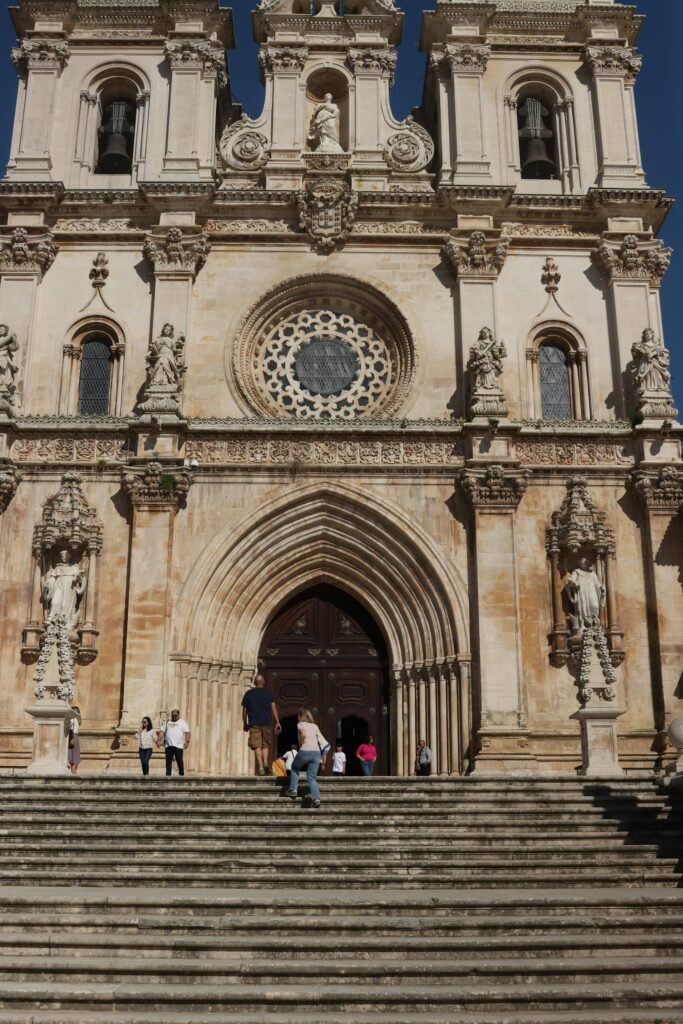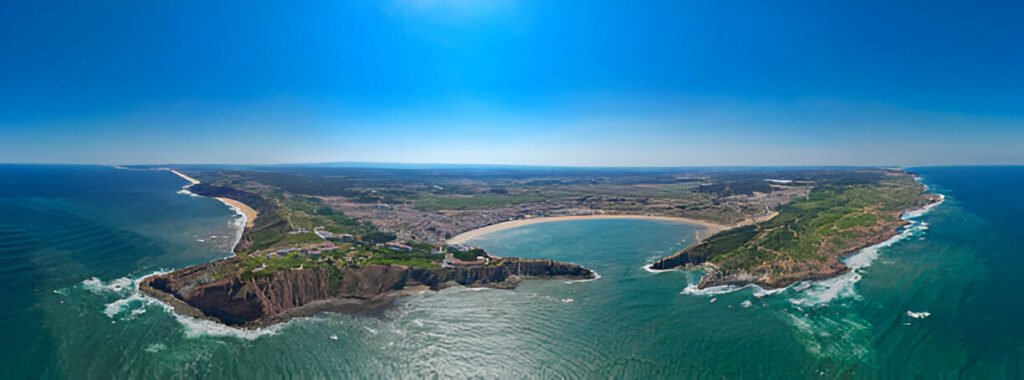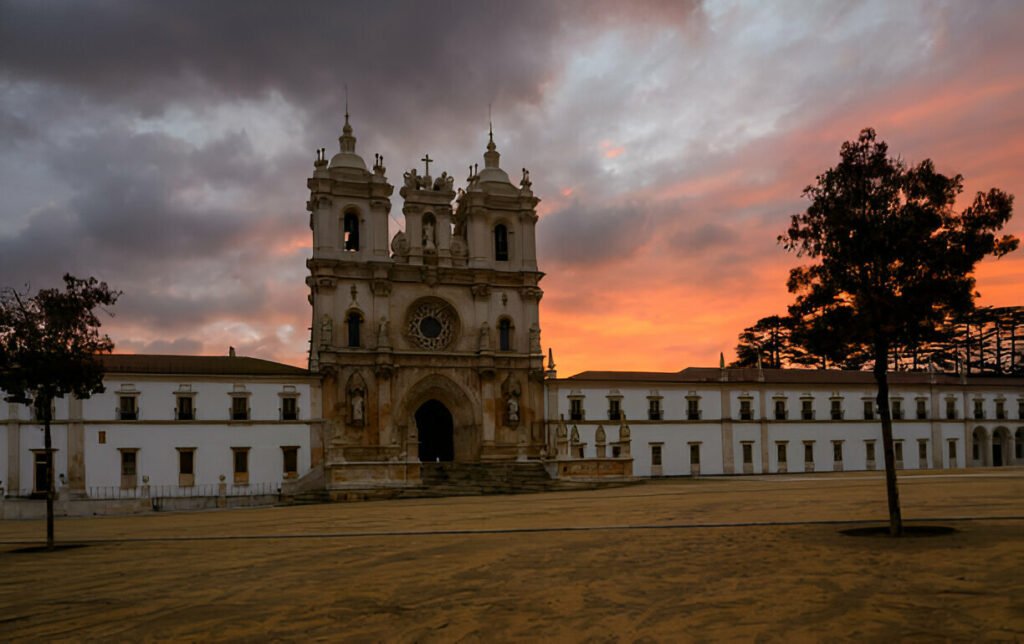Table of Contents
Nestled in the heart of Portugal, Alcobaça is a charming town rich in history, culture, and culinary delights. Known for its stunning monastery, vibrant local traditions, and beautiful landscapes, Alcobaça offers visitors a unique glimpse into Portugal’s past and present. Whether you’re a history enthusiast, a food lover, or simply looking for a peaceful getaway, Alcobaça has something to offer.
A Glimpse into History: The Monastery of Alcobaça
The Jewel of Alcobaça
The Monastery of Alcobaça, a UNESCO World Heritage site, is the town’s crown jewel and one of Portugal’s most significant historical monuments. Founded in 1153 by the first Portuguese King, Afonso Henriques, the monastery stands as a testament to the Cistercian order’s influence in Portugal. Its establishment marked the beginning of a new era in Portuguese monastic life, emphasizing austerity, agriculture, and scholarly pursuits.
Beyond its religious significance, the monastery has played a crucial role in the cultural and political life of Portugal. It became a center for learning and a repository of knowledge during the Middle Ages. The monks of Alcobaça were instrumental in the development of agriculture in the region, introducing new farming techniques and crops that significantly boosted local productivity. Today, the monastery remains a symbol of Portugal’s rich cultural heritage.
Visitors to the Monastery of Alcobaça are often struck by its sense of tranquility and grandeur. The sheer scale of the complex, with its expansive cloisters, vast kitchens, and serene gardens, reflects the monastery’s historical importance. Each stone and carving tells a story, providing a tangible connection to the lives and labors of the Cistercian monks who once called this place home.

Architectural Splendor
The monastery’s architecture is a stunning example of Gothic and Baroque styles. The grand façade, with its intricate carvings and towering spires, is a sight to behold. Inside, the vast nave, beautiful cloisters, and the impressive tombs of King Pedro I and his lover Inês de Castro, whose tragic love story has captivated generations, add to the site’s allure. The blend of architectural styles provides a visual feast, showcasing the evolution of ecclesiastical design over centuries.
One of the most remarkable features of the Monastery of Alcobaça is its sheer size. The church’s nave is one of the largest in Portugal, and its soaring arches and columns create a breathtaking sense of space and light. The monastery’s cloisters, particularly the Cloister of Silence, offer a peaceful retreat, where visitors can reflect on the beauty and serenity of their surroundings. The intricate stone carvings and details found throughout the monastery are a testament to the skill and dedication of the artisans who created them.
In addition to its architectural beauty, the Monastery of Alcobaça is also home to several important works of art. The tombs of Pedro and Inês are masterpieces of Gothic sculpture, adorned with delicate and poignant carvings that tell the story of their tragic love. The sacristy and chapter house contain valuable religious artifacts, including illuminated manuscripts, vestments, and liturgical objects, offering a glimpse into the spiritual and artistic life of the monastery.

The Tragic Love Story of Pedro and Inês
The story of Pedro and Inês is one of Portugal’s most famous romantic tragedies. Inês de Castro was the lover of King Pedro I, and their love affair was met with strong opposition. Inês was eventually assassinated, and a heartbroken Pedro declared her his queen posthumously, exhuming her body and forcing the court to acknowledge her as queen. Their tombs in the monastery, adorned with intricate carvings, face each other so that they can reunite on Judgment Day. This poignant tale adds a deeply personal and emotional dimension to the historical significance of the monastery.
The romance of Pedro and Inês has been immortalized in Portuguese literature, music, and art, becoming a symbol of enduring love and tragic destiny. Their story has inspired countless poets, playwrights, and musicians, who have sought to capture the depth of their passion and the heartbreak of their separation. Visitors to the Monastery of Alcobaça can see the legacy of their love in the beautifully carved tombs, which depict scenes from their lives and their ultimate reunion in the afterlife.
The tragic love story of Pedro and Inês also reflects the broader historical and social context of medieval Portugal. Their relationship was marked by political intrigue, familial conflict, and the harsh realities of court life. By exploring their story, visitors can gain a deeper understanding of the complexities and challenges of the medieval Portuguese monarchy, as well as the timeless nature of love and loss.
Exploring the Town
Historical Center
Alcobaça’s historical center is a delightful place to explore, with its narrow cobbled streets, traditional houses, and charming squares. The town’s layout reflects its medieval origins, and visitors can find various shops, cafes, and restaurants that offer a taste of local life. Walking through the streets of Alcobaça, one can easily imagine what life was like centuries ago, with the town’s well-preserved architecture providing a window into the past.
The Praça 25 de Abril, the main square in Alcobaça, is a bustling hub of activity and a great place to start your exploration of the town. Surrounded by historic buildings, the square is home to several cafes and restaurants where you can relax and enjoy the local atmosphere. Nearby, you’ll find the Town Hall, an impressive building that dates back to the 18th century, as well as the Church of Nossa Senhora da Conceição, a beautiful example of Baroque architecture.
As you wander through the historical center, you’ll come across various landmarks that highlight Alcobaça’s rich history. The Municipal Museum, housed in a former monastery building, offers fascinating exhibits on the town’s past, including archaeological finds, religious artifacts, and traditional crafts. The nearby Jardim do Amor, a lovely garden dedicated to the love story of Pedro and Inês, provides a peaceful spot to reflect on the town’s romantic heritage.

Wine and Gastronomy
Alcobaça is renowned for its culinary heritage, particularly its pastries and wines. The town is famous for its Pão-de-Ló (sponge cake) and the deliciously sweet Frutas Cristalizadas (candied fruits). Alcobaça’s fertile lands also produce excellent wines, and a visit to a local winery is a must for wine enthusiasts. The region’s unique terroir, combined with centuries-old winemaking traditions, results in wines that are rich in flavor and character.
One of the best ways to experience Alcobaça’s culinary delights is by visiting the local markets and bakeries. The Mercado Municipal, the town’s main market, offers a wide variety of fresh produce, meats, cheeses, and baked goods. Here, you can sample the famous Pão-de-Ló and Frutas Cristalizadas, as well as other traditional Portuguese treats. Many of the local bakeries have been in operation for generations, passing down their recipes and techniques through the years.
In addition to its pastries, Alcobaça is also known for its excellent wines. The region’s vineyards produce a variety of red, white, and rosé wines, each with its own distinct flavor profile. Many of the local wineries offer tours and tastings, allowing visitors to learn about the winemaking process and sample some of the best wines the region has to offer. Whether you’re a seasoned wine connoisseur or just starting to explore the world of wine, Alcobaça’s wineries provide a delightful and educational experience.

The Alcobaça Wine Museum
For those interested in the local wine culture, the Alcobaça Wine Museum offers a fascinating look into the region’s viticulture history. The museum showcases traditional winemaking tools, historical artifacts, and offers wine tastings that highlight the unique flavors of Alcobaça’s wines. Located in a beautifully restored building, the museum provides a comprehensive overview of the region’s wine industry, from its early beginnings to the present day.
The exhibits at the Alcobaça Wine Museum cover a wide range of topics related to winemaking. Visitors can learn about the different grape varieties grown in the region, the techniques used to cultivate and harvest the grapes, and the processes involved in fermenting and aging the wine. The museum also features displays on the cultural and social aspects of winemaking, including the role of wine in local traditions and celebrations.
One of the highlights of a visit to the Alcobaça Wine Museum is the opportunity to participate in a wine tasting. The museum offers guided tastings led by knowledgeable staff who can provide insights into the characteristics and qualities of the local wines. These tastings are a great way to discover new favorites and gain a deeper appreciation for the art and science of winemaking. Whether you’re a casual wine drinker or a serious enthusiast, the Alcobaça Wine Museum is a must-visit destination.
Natural Beauty and Outdoor Activities
The Alcobaça River
The Alcobaça River runs through the town, providing a serene backdrop for leisurely walks and picnics. The riverbanks are lined with lush greenery, making it a perfect spot for relaxation and enjoying nature. Strolling along the river, visitors can take in the tranquil scenery and watch as the water flows gently by, creating a peaceful and calming atmosphere.
In addition to its natural beauty, the Alcobaça River is also a popular spot for various outdoor activities. Canoeing and kayaking are great ways to explore the river and its surroundings, offering a unique perspective on the landscape. Fishing is another popular pastime, with the river’s clean, clear waters providing a habitat for a variety of fish species. Whether you’re an experienced angler or just looking to try your hand at fishing, the Alcobaça River offers a rewarding experience.
The riverbanks also provide ample opportunities for picnicking and other leisurely pursuits. Many areas along the river have been developed into parks and recreational spaces, complete with picnic tables, benches, and walking paths. These spots are perfect for a family outing or a romantic picnic, allowing visitors to enjoy the natural beauty of the area while relaxing and unwinding.
Serra de Aire e Candeeiros Natural Park
Just a short drive from Alcobaça, the Serra de Aire e Candeeiros Natural Park offers stunning landscapes and a variety of outdoor activities. Hiking, birdwatching, and exploring the park’s limestone caves are popular activities for nature lovers. The park’s rugged terrain and diverse ecosystems provide a haven for wildlife, making it an ideal destination for those who enjoy spending time in the great outdoors.
The Serra de Aire e Candeeiros Natural Park is home to a network of well-marked hiking trails that cater to all levels of fitness and experience. Whether you’re looking for a challenging hike to the park’s highest peaks or a leisurely stroll through its valleys and forests, there’s a trail to suit your needs. Along the way, you’ll encounter breathtaking vistas, unique rock formations, and a variety of flora and fauna, providing endless opportunities for exploration and discovery.
In addition to hiking, the park is also known for its impressive limestone caves. The Grutas de Mira de Aire, the largest cave system in Portugal, is a must-see attraction. These spectacular caves feature stunning stalactites and stalagmites, underground lakes, and intricate rock formations, all illuminated by carefully placed lighting. Guided tours are available, offering fascinating insights into the geology and history of the caves. For those interested in birdwatching, the park is home to a wide variety of bird species, including several rare and endangered species, making it a paradise for bird enthusiasts.
Beaches Near Alcobaça
While Alcobaça itself is inland, it is conveniently close to some beautiful Atlantic beaches. The nearby coastal towns of Nazaré and São Martinho do Porto are perfect for a day trip, offering golden sands, clear waters, and vibrant seaside culture. These beaches provide the perfect escape for those looking to enjoy the sun, sea, and sand, and they are easily accessible from Alcobaça.

Nazaré, just a short drive from Alcobaça, is one of Portugal’s most famous beach destinations. Known for its massive waves and vibrant surf culture, Nazaré attracts surfers from around the world. The town’s wide sandy beach is perfect for sunbathing and swimming, while its picturesque streets and lively atmosphere offer plenty of dining and shopping options. For a stunning view of the coastline, visitors can take the funicular to the Sítio district, perched high above the town.
São Martinho do Porto, another nearby coastal gem, is known for its sheltered bay and calm waters. This family-friendly beach is ideal for swimming and water sports, and its scenic promenade is lined with cafes and restaurants where you can enjoy fresh seafood and other local specialties. The town’s relaxed vibe and beautiful natural setting make it a perfect spot for a leisurely day by the sea.
Festivals and Events
Cistercian Fair
One of Alcobaça’s most popular events is the Cistercian Fair, which celebrates the town’s monastic heritage. Held annually, the fair features medieval reenactments, traditional crafts, and local gastronomy, providing a lively and immersive experience for visitors. The fair is a vibrant celebration of Alcobaça’s history and culture, attracting locals and tourists alike.
During the Cistercian Fair, the streets of Alcobaça come alive with the sights and sounds of medieval times. Costumed performers reenact scenes from the town’s past, including jousting tournaments, archery displays, and traditional music and dance performances. Artisans and craftsmen demonstrate their skills, offering a glimpse into the trades and crafts that were practiced by the Cistercian monks and the local community.
The fair also features a wide variety of food and drink, showcasing the best of Alcobaça’s culinary heritage. Visitors can sample traditional dishes and local specialties, including the famous Pão-de-Ló and Frutas Cristalizadas, as well as a selection of regional wines. The fair’s lively atmosphere and rich array of activities make it a highlight of the year for both residents and visitors, offering a unique and enjoyable way to experience the town’s heritage.
International Chocolate Festival
For those with a sweet tooth, the International Chocolate Festival in Óbidos, just a short drive from Alcobaça, is a must-visit. The festival showcases stunning chocolate sculptures, workshops, and tastings, making it a chocolate lover’s paradise. Held annually, the festival attracts chocolatiers and visitors from around the world, celebrating all things chocolate in the picturesque setting of Óbidos.
The International Chocolate Festival features an impressive array of chocolate creations, from intricate sculptures and elaborate cakes to delectable truffles and pralines. Master chocolatiers from Portugal and beyond display their skills and creativity, competing for top honors in various categories. Visitors can watch live demonstrations and participate in workshops, learning techniques for making and decorating chocolate treats.
In addition to the artistic and culinary aspects, the festival also offers plenty of opportunities to indulge in chocolate. Numerous stalls and vendors offer a wide range of chocolate products, from classic bars and bonbons to innovative and unusual flavors. Tastings and pairings with wine and other beverages provide a sensory experience that delights the palate. The festival’s festive atmosphere and delicious offerings make it a highlight of the year for chocolate enthusiasts and anyone looking to satisfy their sweet tooth.
FAQs for Traveling to Alcobaça
1. What is the best time to visit Alcobaça?
The best time to visit Alcobaça is during the spring (April to June) and autumn (September to October) when the weather is mild and the tourist crowds are smaller. These seasons offer pleasant temperatures and a relaxed atmosphere, making it ideal for sightseeing and outdoor activities.
2. How do I get to Alcobaça?
Alcobaça is accessible by car, bus, or train from major cities like Lisbon and Porto. The town is approximately 100 kilometers north of Lisbon and can be reached within a 1.5-hour drive. Public transportation options include regular bus services and train connections, making it easy to reach Alcobaça from various parts of Portugal.
3. Do I need to book tickets in advance for the Monastery of Alcobaça?
While it’s not always necessary to book tickets in advance, it is recommended during peak tourist seasons and holidays to avoid long lines. Booking online can also provide additional information about special exhibits and guided tours, enhancing your visit to this historic site.
4. What local dishes should I try in Alcobaça?
Be sure to try the Pão-de-Ló, Frutas Cristalizadas, and the local wines. Additionally, the region’s seafood dishes and traditional Portuguese fare are also highly recommended. Don’t miss out on trying Bacalhau à Brás and Caldeirada, which are local favorites.
5. Are there any guided tours available in Alcobaça?
Yes, guided tours are available for the Monastery of Alcobaça, the historical center, and local wineries. These tours offer valuable insights into the town’s history and culture, providing a deeper understanding and appreciation of the area’s rich heritage.
6. What outdoor activities can I do in Alcobaça?
Popular outdoor activities include hiking in the Serra de Aire e Candeeiros Natural Park, visiting the beaches in Nazaré and São Martinho do Porto, and enjoying picnics along the Alcobaça River. The town and its surroundings offer a variety of options for nature enthusiasts and adventure seekers.
7. Is Alcobaça family-friendly?
Yes, Alcobaça is a family-friendly destination with various attractions suitable for all ages, including historical sites, outdoor activities, and family-oriented festivals. The town’s safe and welcoming atmosphere makes it an ideal destination for families traveling with children.
8. What are the best accommodation options in Alcobaça?
Alcobaça offers a range of accommodation options, from charming guesthouses and boutique hotels in the town center to rural retreats and holiday homes in the surrounding countryside. Whether you prefer a cozy bed and breakfast or a luxurious hotel, there’s something to suit every taste and budget.
9. Are there any special events in Alcobaça?
Yes, Alcobaça hosts several special events throughout the year, including the Cistercian Fair, music festivals, and cultural celebrations. These events provide a wonderful opportunity to experience the town’s vibrant culture and traditions.
10. Can I visit nearby attractions from Alcobaça?
Yes, Alcobaça is conveniently located near several attractions, including the coastal towns of Nazaré and São Martinho do Porto, the medieval town of Óbidos, and the Batalha Monastery. These nearby destinations offer a variety of experiences and are easily accessible for day trips.
Useful Websites
- Visit Portugal (Official Tourism Website): https://www.visitportugal.com
- Monastery of Alcobaça Official Website: https://www.mosteiroalcobaca.gov.pt
- Alcobaça Municipality Website: http://www.cm-alcobaca.pt
- Alcobaça Wine Museum: https://www.cm-alcobaca.pt/pt/menu/148/museu-do-vinho.aspx
- Serra de Aire e Candeeiros Natural Park: https://www.icnf.pt
- Nazaré Tourism: https://www.cm-nazare.pt
- International Chocolate Festival (Óbidos): https://www.obidos.pt
- Portuguese Immigration and Borders Service (SEF): https://www.sef.pt
- Alcobaça Hotel Recommendations: https://www.booking.com
- Public Transportation in Portugal: https://www.cp.pt
Final Thoughts
Alcobaça, Portugal, is a destination that offers a blend of historical richness, cultural vibrancy, and natural beauty. From the majestic Monastery of Alcobaça to the delicious local cuisine and picturesque landscapes, every corner of this town tells a story. Whether you are exploring its historical sites, savoring its culinary delights, or enjoying the scenic outdoors, Alcobaça promises an unforgettable experience. Plan your visit today and immerse yourself in the charm and elegance of this remarkable Portuguese town.
























